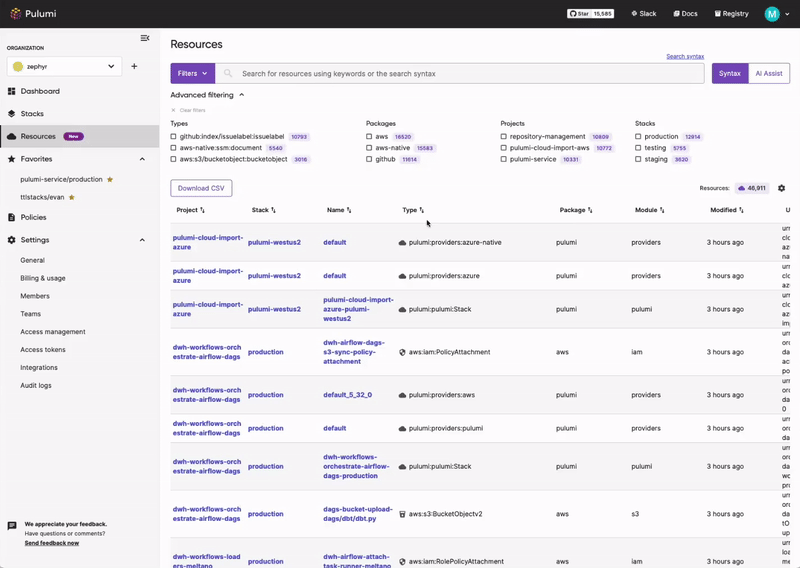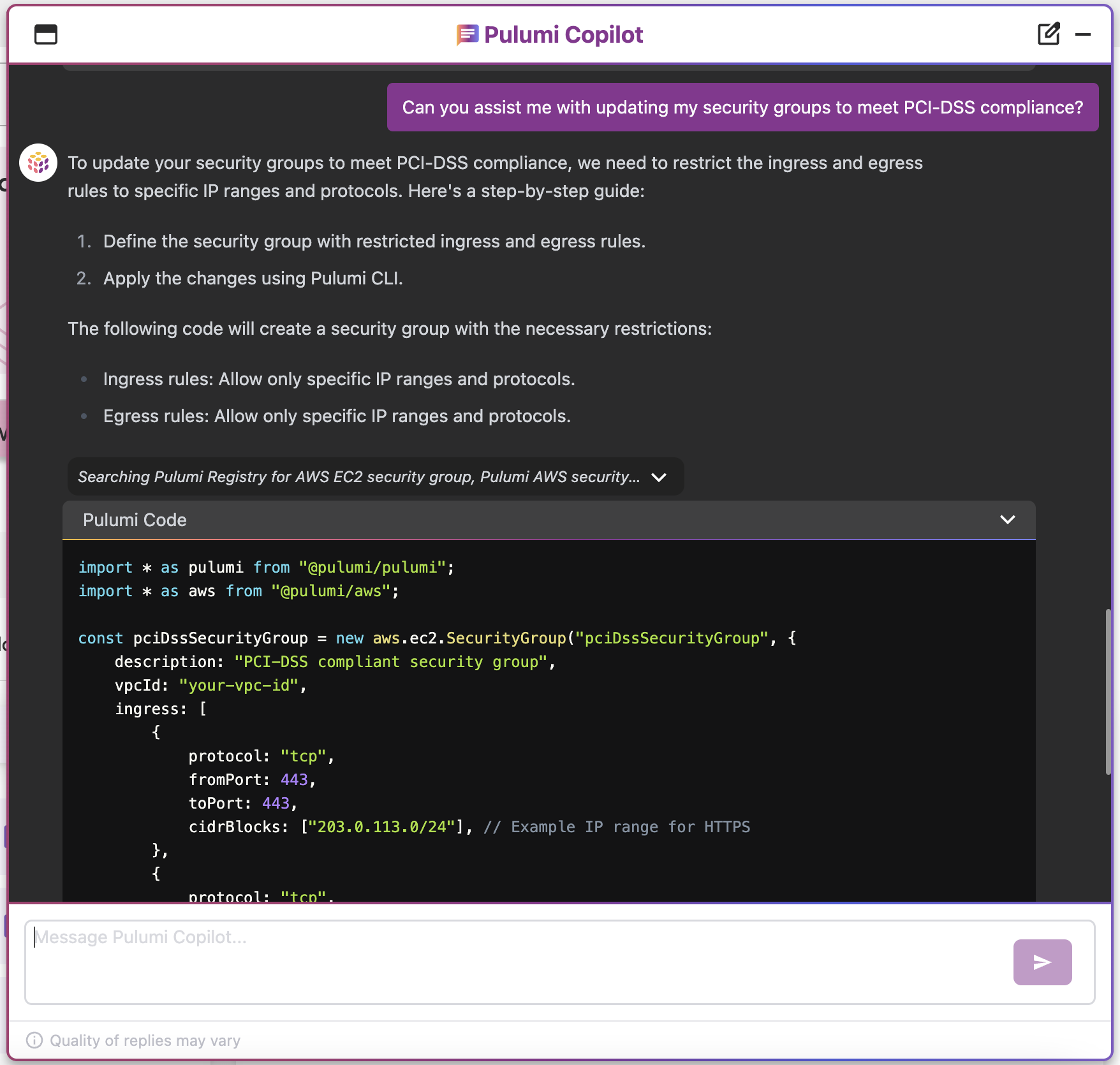How to Achieve PCI DSS Compliance for AWS EC2
How to Achieve PCI DSS Compliance for AWS EC2
PCI DSS compliance is critical to protecting cardholder data that is processed, stored, and transmitted. Pulumi can assist you with making your AWS infrastructure PCI DSS compliant. Pulumi can help you identify existing cloud resources that are not in compliance, and it can also enforce compliance policies proactively before infrastructure is deployed. Get started with Pulumi to use these compliance tools or speak with a Solutions Architect to get an expert consultation.
What is PCI DSS Compliance?
PCI DSS (Payment Card Industry Data Security Standard) compliance refers to the adherence to a set of security standards designed to protect card information during and after a financial transaction. These standards are established by the Payment Card Industry Security Standards Council (PCI SSC), which was founded by major credit card companies like Visa, MasterCard, American Express, Discover, and JCB.
Key Aspects of PCI DSS Compliance
- Security Controls: Organizations must implement specific technical and operational security measures to safeguard cardholder data. This includes requirements like installing firewalls, encrypting cardholder data, and using antivirus software.
- Access Control: Only authorized personnel should have access to cardholder data. This involves setting up strong access control measures, such as unique user IDs and restricting physical access to sensitive data.
- Monitoring and Testing: Regularly monitor and test networks to ensure that security controls are functioning correctly and to identify vulnerabilities. This includes maintaining logs of all access to network resources and cardholder data.
- Information Security Policy: Organizations must maintain a policy that addresses information security for employees and contractors. This includes regular security awareness training.
- Regular Audits: Organizations that process, store, or transmit credit card information must undergo regular audits to ensure they are in compliance with PCI DSS requirements. This can involve self-assessment or external assessments, depending on the size of the organization and the volume of transactions processed.
Pulumi Insights
Use Pulumi Insights to gain visibility into your cloud infrastructure's configuration to assess PCI DSS compliance. Pulumi Insights is Intelligent Cloud Management. It helps you gain security, compliance, and cost insights into the entirety of your organization's cloud assets and automatically remediate issues.

Pulumi Copilot
Use Pulumi Copilot to assist configuring your infrastructure to make it compliance ready. You can tap into the Pulumi Copilot's deep understanding of your organization's context to gain visibility into the configuration of resources and assess their compliance.

Compliance Ready Policies
With comprehensive coverage of AWS, Pulumi Compliance Ready Policies provide an enhanced level of control and governance over your cloud resources. Pulumi Compliance Ready Policies empower you to enforce best practices, security standards, cost controls, and compliance requirements seamlessly within your infrastructure-as-code workflows.
What is EC2 resources?
Amazon EC2 (Elastic Compute Cloud) is a web service that provides scalable computing capacity in the cloud, allowing users to run virtual servers on-demand. It offers server instances, storage, and networking options to tailor the infrastructure to specific application needs.
What controls can I put in place to evaluate EC2 resources resources?
- Amazon EBS snapshots should not be publicly restorable
- VPC default security groups should not allow inbound or outbound traffic
- Attached Amazon EBS volumes should be encrypted at-rest
- Stopped EC2 instances should be removed after a specified time period
- VPC flow logging should be enabled in all VPCs
- EBS default encryption should be enabled
- EC2 instances should use Instance Metadata Service Version 2 (IMDSv2)
- Amazon EC2 instances should not have a public IPv4 address
- Amazon EC2 should be configured to use VPC endpoints that are created for the Amazon EC2 service
- Unused Amazon EC2 EIPs should be removed
- Security groups should not allow ingress from 0.0.0.0/0 or ::/0 to port 22
- Security groups should not allow ingress from 0.0.0.0/0 or ::/0 to port 3389
- Amazon EC2 subnets should not automatically assign public IP addresses
- Unused Network Access Control Lists should be removed
- Amazon EC2 instances should not use multiple ENIs
- Security groups should only allow unrestricted incoming traffic for authorized ports
- Security groups should not allow unrestricted access to ports with high risk
- Both VPN tunnels for an AWS Site-to-Site VPN connection should be up
- Network ACLs should not allow ingress from 0.0.0.0/0 to port 22 or port 3389
- Amazon EC2 Transit Gateways should not automatically accept VPC attachment requests
- Amazon EC2 paravirtual instance types should not be used
- Amazon EC2 launch templates should not assign public IPs to network interfaces
- EBS volumes should be covered by a backup plan
- EC2 transit gateway attachments should be tagged
- EC2 transit gateway route tables should be tagged
- EC2 network interfaces should be tagged
- EC2 customer gateways should be tagged
- EC2 Elastic IP addresses should be tagged
- EC2 instances should be tagged
- EC2 internet gateways should be tagged
- EC2 NAT gateways should be tagged
- EC2 network ACLs should be tagged
- EC2 route tables should be tagged
- EC2 security groups should be tagged
- EC2 subnets should be tagged
- EC2 volumes should be tagged
- Amazon VPCs should be tagged
- Amazon VPC endpoint services should be tagged
- Amazon VPC flow logs should be tagged
- Amazon VPC peering connections should be tagged
- EC2 VPN gateways should be tagged
- EC2 Client VPN endpoints should have client connection logging enabled
- EC2 transit gateways should be tagged
- EC2 security groups should not allow ingress from 0.0.0.0/0 to remote server administration ports
- EC2 security groups should not allow ingress from ::/0 to remote server administration ports
Speak to a Solutions Architect to implement policy as code to manage EC2 resources for PCI DSS compliance.
Talk to a Solutions Architect
Get in touch with our Solutions Architects to get all your resources in use with Pulumi Insights